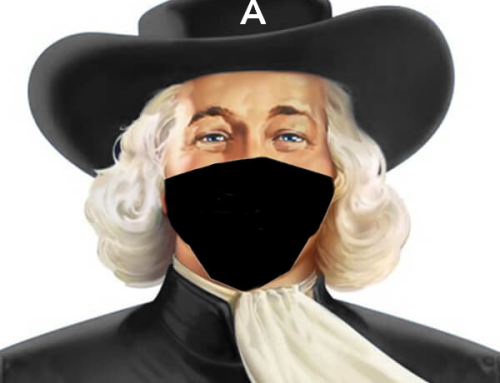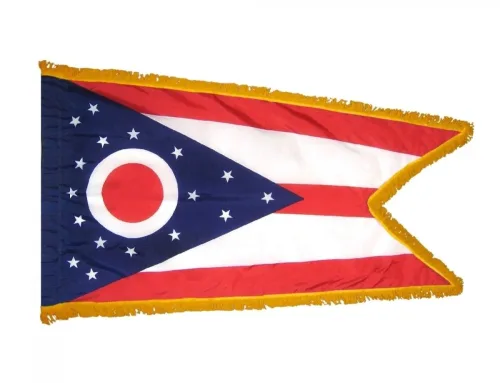It should be of some interest—perhaps not only in a sentimental sense—that the lands that birthed so many of the drivers of neoliberalism and contemporary fascism were also the birthplace of the left-wing movements like the founders of the Communist Party of the United States of America.
By Taylor Dorrell
In the Cleveland offices of the Selmar Hess Publishing Company in 1907, the air seemed to hum with more than just the hustle of industrious salesmanship. Gathered away from their desks, a half dozen salesmen would form an audience to a curious intellectual theater where the clash between reform and revolution played out like a living dialectic. At the center stood MacBain Walker, a fervent proponent of socialism, his arguments infused with the rhetoric of Karl Marx. He championed Cleveland’s progressive wave, hailing municipal ownership of the city’s street railways—an initiative propelled by the visionary mayor, Tom Johnson. But Walker’s aspirations reached far beyond reforms: he envisioned a city, a nation, an entire world where public ownership ruled over all productive enterprise.
Beside him, Ruthenberg stood in sharp contrast. A respectable Babbitt figure, he defended the free market with the vigor of a man who believed in tempered reform over sweeping change. A municipal-owned railway, yes, but his faith lay in the cautious virtues of enterprise and the modest progress of the market. His co-workers couldn’t have imagined that this defender of capitalism would later defy these positions and found the country’s Communist Party, etching his name into a century riddled with radical upheavals and endless debates over the very essence of reform and revolution.
The son of German immigrants, Ruthenberg grew up in a working-class household—his father worked as a longshoreman on the Cuyahoga River. He went on to get a managerial job at a book publisher and became a fierce defender of liberal reforms of capitalism—influenced greatly by his favorite authors at the time: Thomas Paine, Jefferson, Ralph Waldo Emerson, and Henry David Thoreau. Ruthnberg’s son, Daniel, insisted that “instead of merely reading these great Americans, my father believed with them and acted on their principles.”
But as the debates with Walker went on, he increasingly became dissatisfied with his capitalistic positions. After one Ruthenberg-Walker debate in the publishing house, the small crowd clapped for Walker, communicating a win for socialism. Out of frustration, Ruthenberg responded by walking to the Cleveland Public Library and checking out a copy of Marx’s first volume of Capital. It was said that once the news of the debate reached his boss, Ruthenberg was fired. He became a socialist within a year.
Red Ohio
In the opening sentence of Oakley C Johnson’s The Day is Coming: Like and Work of Charles E. Ruthenberg, he takes a moment to reflect on the region in which much of Ruthenberg’s life takes place. “The Midwest is that part of the United States usually regarded as characteristic of the country as a whole, possessing the manufacturing and business skills of the East and the food-producing powers of the West,” he wrote in 1957. “It is of some interest—perhaps only in a sentimental sense—that Cleveland, the chief city of Ohio, was also the birthplace of the man who was to found and, until his death, lead the Communist Party of the United States.”
In 1909, Ruthenberg was working in a sales job at a roofing company. By night, he was at the Socialist Party headquarters, writing for the party papers, participating in various committee meetings, and taking their campaigns to the street corners of Cleveland. Cleveland’s Socialist Party had the second highest membership in Ohio with 342 in January 1909, trailing only Cincinnati. He quickly climbed their ranks and by the next year, he was on the ballot for Ohio state treasurer, earning 60,000 votes and contributing to the state’s largest overall number of votes for the Socialist Party in the country. Ohio was America’s first red state.
Over the following years he ran for the Senate, mayor of Cleveland, and governor of Ohio. And while he never won, Ruthenberg garnered influence and an audience keenly interested in his politics. When Cleveland’s garment workers went on strike in the summer of 1911, Ruthenberg and the Socialist Party held meetings in the streets to rally support for the strikers. At a massive Labor Day rally, he was invited to answer union members’ questions to mayoral candidates. When asked how he’d settle the strike, he responded that he’d give political power to the workers to help win the strike, deputizing strikers to defend the pickets and giving them a voice in government. The “ultimate aim is a revolution which will sweep out of existence the cause of strikes.” The Cleveland Plain Dealer admit the next day that “Judged by the reception tendered each, Ruthenberg will be Cleveland’s next Mayor.”
“I communicated these ‘poisonous’ doctrines to Charles,” Walker, the co-worker who debated Ruthenberg later recalled, “but the pupil was soon ahead of the teacher.”
When the U.S. entered World War I in 1917, Ruthenberg led the anti-war campaign at the Socialist Party’s National Emergency Convention in St. Louis, insisting that the party should not support the conflict like the European socialist parties had. But in June, Ruthenberg, along with Ohio SP organizers Alfred Wagenknecht and Charles Baker, were arrested for obstructing the military draft. They were swiftly convicted in November—the same month as the Bolshevik Revolution—and began serving a one-year prison term in January 1918. The Ohio Socialist Party state convention gathered outside the prison and heard a speech that would lead to the orators arrest: Victor Eugene Debs. His famous anti-war speech was delivered in support of Ruthenberg and other Ohio socialists. For the remainder of his life, Ruthenberg was either in prison or facing new charges.
Upon his release from the Canton workhouse as World War I was ending, Ruthenberg immediately resumed his activism. The Socialist Party’s Left Wing Section, driven by frustrations over the leadership’s lukewarm responses to WWI, the Russian Revolution, and refusal to join the Communist International, was gaining strength. Ruthenberg led a campaign to steer the party to the left and they won 12 of the 15 seats on the National Executive Committee. However, the old leadership rejected the results and initiated a purge, expelling left-led state parties and foreign language federations, which represented the majority of members and effectively split the Socialist Party thanks to the maneuvers of the right wing bureaucracy in the Party.
Communist Party
In the 1981 Warren Beatty film, Reds, journalist John Reed and his partner Louise Bryant live through the Socialist Party’s struggles around the time of the Russian Revolution. The film captures Reed’s commitment to building an unapologetically communist political party as internal disputes undermine the movement. The goal was to unite the quickly formed Communist Party of America and the Communist Labor Party after the members were expelled from the Socialist Party. However, it wasn’t John Reed and Louis Fraina that carried this out alone, but Ruthenberg. “The story was a bit more complex than the ‘immigrants vs. native born’ narrative that played out in the film,” CJ Atkins writes.
Communist leaders were forced underground or deported during the “Palmer Raids” then Ruthenberg was convicted in 1920 for “criminal syndicalism” and sent to Sing Sing prison. After 18 months, he was released on appeal and worked successfully with Wagenknecht to unite the two communist parties under the banner of the Workers (Communist) Party. He was soon again arrested, this time with 16 others at a party convention in Bridgman, Michigan in 1922 including labor leader and future Communist Party leader Willliam Z Foster—this resulted in the so-called “Michigan Defense” involving the ACLU and garnering the support of Debs, Elizabeth Gurley Flynn, and other labor leaders.
“Communist intellectuals are the most facile and articulate of all writers, and words come out of most of them like water from a faucet,” fellow Ohioian James Thurber complained of the unrealistically lengthy and intellectual letters of Joseph Freeman. The criticism, lobbied specifically against Freeman’s collected letters, was not foreign to those inside the Communist movement either. As the first leader of the Communist Party, Ruthenberg emphasized the need to be a part of the working-class of their country, not just become a fan club of the Russian revolution or a book club.”Our crying need is a more precise and understandable expression of Communism as part of the everyday working class fight in the United States,” he wrote in The Communist. Writing a letter to a friend while in Sing Sing prison, he confessed that “My greatest impulse is to transform theory into action.”
Passing and Legacy
Like so many fervent organizers in the Communist Party, Ruthenberg organized himself to the grave. In February 1927, Ruthenberg was jotting down notes at the Party’s Political Committee meeting in Chicago when William Z. Foster told him: “You look sick, Charley.” “Yes, Bill, I’m kind if under the weather,” he said as he continued writing. A couple of hours later, he collapsed. Three days after an emergency appendectomy surgery, he died of acute peritonitis.
Ruthenberg’s body was laid in state at the Ashland Boulevard Auditorium in Chicago where Foster and other spoke before a large crowd marched to the Graceland Cemetery Chapel where the body was cremated. The bronze urn was transported to New York where multiple memorial meetings were held on March 9. The seats of Carnegie Hall, the Central Opera House, and the New Star Casino were filled to capacity as speakers shuffled between the locations. Memorial meetings spread throughout the country, especially in cities throughout Ohio to remember the figure. Since Ruthenberg was elected to the Presidium of the Communist International a few years earlier, the Communist Party of the Soviet Union requested his ashed be sent there for burial. The Cleveland native is one of three Americans whose ashes are interred in the Kremlin Wall next to John Reed and Big Bill Haywood.
With his emphasis on action, it’s not unusual to find that there exists few collections of Ruthenberg’s writings—in fact, there’s only one, Voices of Revolt, published by the Party’s publisher International Publishers in 1928 (Johnson’s biography published by International Publishers in 1957 is the only other book about the Ohioan). The editor of the Party’s Daily Worker observed that “If… routine duties had been lifted off Ruthenberg’s shoulders… our party would certainly have had a greater literature from the pen of our fallen leader.”
While critics and anti-communist historians accuse the organizer of those common Marxist offenses—James G. Ryan described him as “humorless” and “power hungry”Earl Browder the Failure of American Communism—his legacy within the Communist Party, which still exists, is relatively obscured too. “When the key figure who had lionized Ruthenberg, expelled CP leader Jay Lovestone, fell out of official favor, his publications associated with Ruthenberg were expunged from the record along with him,” CJ Atkins, the current managing editor of the Party’s news site People’s World wrote in the 2020 book, Faith in the Masses.
At one of his many trials, a prosecutor asked Ruthenberg how he converted to socialism. “Through the Cleveland Public Library,” he answered. While his remains might be in the Kremlin wall, appearing to give credence to the claims that communism is an import from radicals abroad, his story is, on the contrary, distinctly American. Charged by those writers and orators like Robert G. Ingersoll and Mark Twain, remaining cohorts with Eugene Debs and Elizabeth Gurley Flynn, Ruthenberg was at the center of so many struggles throughout the 1910s and 1920s in the US.
It should be of some interest—perhaps not only in a sentimental sense—that the lands that birthed so many of the drivers of neoliberalism and contemporary fascism were also the birthplace of the left-wing movements like the founders of the Communist Party of the United States of America. Ruthenberg’s dismissal in American history reflects a larger legacy of either whitewashing resistance or, when that whitewashing is too laborious, erasing that resistance altogether. In Roughing It, Mark Twain wrote that “Ours is the ‘land of the free’—nobody denies that—nobody challenges it. (Maybe it is because we won’t let other people testify.)” With the rise of fascism across the globe, reviving these figures of resistance could, if applied not exclusively in the confines of book clubs and lengthy letters, help preserve democracy and fight for the kind of egalitarian society the world has yet to produce.






